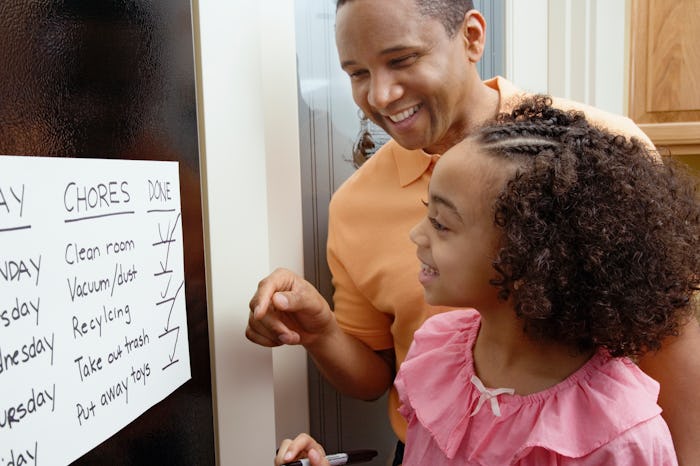Life

Here's Why This Is The Perfect Time To Start A Chore Chart For Your Family
With everyone stuck inside these days, there's probably a little more home upkeep needed than usual. That's okay, though, because you can take this opportunity to teach your kids a thing or two about the tasks that make a house run. Since everybody is also a little extra bored lately, now is the best time to start a chore chart for your family.
As a kid, your parents probably had you do something around the house to pull your weight, like keeping your room clean, taking the dog for walks, or washing the windows. Early childhood and Montessori teacher Jackie Horton tells Romper that you can start having your kids do the same when they are as young as 2 years old. Even better, now is an ideal time to do it. "This time of quarantine could be a great opportunity to introduce chores to little ones," Horton says, because "your children are watching you do dishes, fold laundry, make beds, etc. on a daily basis and these are all tasks they can attempt to do themselves." Additionally, Horton says kids do best when they have a routine, which can be difficult during this unique time, but "having [them] do two or three chores every day" will help establish the daily routine and prepare them to continue to do these chores once they're back in school.
Of course, whatever chores you assign to your children need to be age-appropriate. "We obviously don’t expect a toddler to mow the lawn or take out the trash," Horton says, "but it is great to introduce a couple small tasks such as picking up their clothes off the floor, feeding the family pet, or making their bed." Once they start to get a little older, Horton adds, "it’s easy to change these every day tasks and make them more challenging to fit their age" since they will already be in the habit of doing daily chores.
There are a lot of benefits to having your child participate in these kinds of tasks, too (beyond just helping you out around the house). Daily chores teach responsibility, necessary life skills, and can even "bridge the housework gender gap," Horton says. Additionally, they can help "establish a mindset of community at a very young age" so that kids understand "we take care of our family by doing dishes, cooking dinner, etc."
If you like the idea of instilling the "community" mindset, Horton suggests not offering any type of reward for completing tasks. "Coming from a Montessori background, the point of these chores for little ones is to get them in the habit of doing something that isn’t necessarily fun for the sake of the family," she says. "It is just a part of life to keep a tidy home, and unfortunately they are not rewarded when they do the dishes (although sometimes they feel that they should be)."
By introducing and starting the chore chart now, you're allowing your child to learn how to do these tasks and to practice them every day without the distractions of the rushed morning routine or dinnertime frenzy that usually accompanies a typical school day. They have the time to master their chore and make a habit of it now so that it's something they can stick with once school starts back up. Plus, you'll have a "solution" any time they complain they're bored.
Expert:
Jackie Horton, Early Education & Montessori Teacher